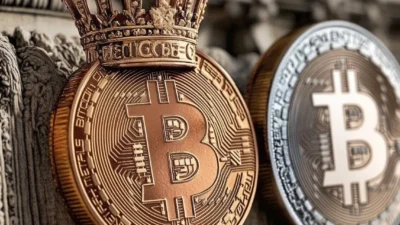TLDR
- A memo released by the DOJ last week officially ended its regulation by a prosecution approach to the crypto industry.
- The agency is falling in line behind President Trump’s executive order.
- Their new focus? Going back to tacking crime and bad guys.
The U.S. Department of Justice (DOJ) issued a memo last week that could bring a major shift in how crypto is treated legally. To put it simply? The days of trying to regulate crypto through courtroom drama may be over.
Here’s what you need to know about the DOJ’s move, what it means for crypto companies, and how it might impact you as someone exploring or investing in the space. This is a huge win for the industry, innovation, and users. Let’s get after it/
From Fear to Fairness: What’s in the Memo?
The DOJ’s new approach, rooted in Executive Order 14178, sets the tone for how the Justice Department plans to handle digital assets moving forward.
Instead of pursuing crypto firms for technical missteps and regulatory gray areas, the department is focusing its energy on real crime, such as fraud, theft, and money laundering tied to digital currencies.
Here are the headlines from the memo:
- No more “regulation by prosecution”: The DOJ will no longer target exchanges, mixers, or wallet providers for violations their end users might commit (unless there’s intent involved).
- Shifting focus to criminal activity: Investigations and prosecutions will prioritize crimes like embezzlement, rug pulls, and scams targeting investors, as well as using crypto to fund illegal activities like terrorism or narcotics trade.
- Prosecutorial discretion: Cases concerning licensing or registration rules that arise from confusing or poorly communicated regulations will no longer be immediately treated as criminal cases.
TLDR? The DOJ wants to protect investors and crack down on bad actors without stifling legitimate businesses.
That’s all we’ve asked for for years. Thank you.
What’s Changing For Crypto Companies
Crypto firms (and users) just breathed a collective sigh of relief. Previously, many businesses felt like they were walking blindfolded through a legal minefield, thanks to Operation Chokepoint..
Now, there’s clarity. Sweet, sweet clarity.
The DOJ recognizes it’s not a digital assets regulator, and it’s handing much of that responsibility back to agencies like the SEC and CFTC. What does this mean in practice?
1. Fewer Legal Battles For Companies
Under the previous administration, the DOJ had a reputation for taking crypto companies to court for regulatory violations. This aggressive tactic, often dubbed “regulation through prosecution,” left the industry confused and apprehensive.
2. Investor Protection at the Forefront
The memo places a spotlight on safeguarding those exploring crypto investment. Prioritizing cases involving scams, fraud, and fund misappropriation shows the DOJ is now prioritizing bad actors. And they will be held accountable without needlessly penalizing businesses.
At the end of the day, that’s the DOJ’s job. Not to tell us how to bank. Not to stifle innovative businesses. But to protect American citizens from bad guys.
3. Disbanding Enforcement Teams
If you’ve followed crypto law enforcement, you may have heard of the National Cryptocurrency Enforcement Team (NCET). It’s no more. The team is being dissolved as resources are shifted toward other pressing priorities.
This is the government we’re talking about. Every action they take, no matter how insignificant, costs tax dollars. And who pays tax dollars? We do. Every time the DOJ, SEC, or any other regulatory body “unleashed the hounds” on a crypto company, it cost all of us money. Think about it.
What This Means For Crypto Users
If you’re new to crypto, you might be wondering, “Why should I care?”
Well, here’s what this shift boils down to for you as an investor or curious explorer of blockchain tech:
- Greater trust in the system – Cracking down on scams and fraudulent schemes makes the space safer for individuals like you to experiment, invest, and explore without the constant fear of losing your assets to bad actors.
- More innovation, fewer barriers – For crypto to grow, companies need room to innovate. This policy shift ensures that legitimate companies can bring products to market without the overhead of constant fear of litigation. More innovation means better tools, platforms, and opportunities for everyone.
- Clarity moving forward – With clearer regulations in the works, the DOJ can step back from its role as an unofficial crypto regulator. The end result will be a more transparent and reliable ecosystem.
The Bigger Picture For All of Crypto
The DOJ’s return to focusing energy and resources on criminal activities that hurt society at large, rather than overburdening an emerging industry with unclear legal expectations, is yet another step in the future we want to see.
It aligns with the current administration’s goal to defend blockchain innovation for the future. We’re moving from a hostile environment to a cooperative one.
Unfortunately, we found this story buried under what it means for Do Kwon and his upcoming trial. We’re not sure if major crypto news outlets realized the implications of this action or if they didn’t think it was newsworthy enough for their audience.
Don’t worry. We caught it and we’ve got you covered. We don’t want to downplay his (alleged) atrocities. But what’s happening right now and its impact on the future that’s coming, at least to us, has more value as far as news.
Where We Go From Here
Does this mean it’s all smooth sailing for crypto companies and investors? Not quite.
We’ve said this quite often. And now, we’re saying it again. While this is a step forward, there’s still work to be done to create a coherent regulatory framework for digital assets in the US. From the STABLE and GENIUS Acts on the national level to bills making their way through various states, regulation is a work in progress.
The DOJ’s memo also makes it abundantly clear that the focus will now shift to prosecuting cases of fraud, money laundering, and the funding of illegal activity. For companies with clean hands, this loosening of the DOJ’s grip could mean more of a focus on business growth and less on litigation.












